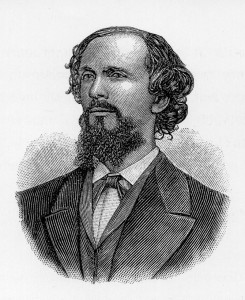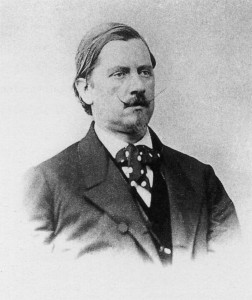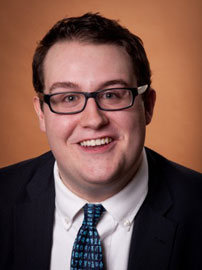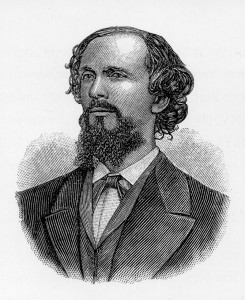Many of us in the “community” often use the terms LGBTQ out of habit, perhaps stopping to add or subtract letters, but still taking for granted the ideas behind the words. However, throughout history the queer/trans “umbrella” has not only been much wider- it once didn’t exist at all. For example, in what is now called the United States, there have been at least 100 diverse roles and identities that have, only since European invasion, been labeled as “queer” or “transgender.” For my CSP this year, my mentor Dr. Joelle Ryan and I are researching “queer history” in a different way by not giving a history of “queer people” but instead of the idea of “queerness” itself. Here is a brief (and hopefully not too dull!) outline of the history of the word “homosexual.”

Karl Ulrichs, writer and human rights pioneer.
Ironically, the very prejudice that homosexual people have been fighting for centuries is what brought the concept of homosexuality into the world. Though many Western cultures had originally focused on the sin of sodomy rather than attempting to classify people who performed it, the growth of Western sciences that wanted to examine human nature meant these actions and the people behind them became things to study and theorize.
Originally it was only through the assumption of women exclusively loving and having sex with men (and vice-versa) that anyone who failed to conform became out of place: something to be studied, understood, labeled, and explained. Left with the “puzzle” of these desires, Western explanations in the 19th century first labeled people we might now call lesbian or gay as “inverts” (or a similar German concept of uring)- people who were “born” as one gender but had the spirit of the “other,” supposedly explaining their romantic/sexual orientation and, occasionally, mannerisms.
Looking at these precursors to “homosexuality,” it’s easy to see here how culture can influence the words we create. The assumption that everyone was heterosexual was so strong in the West, anyone who challenged the assumption could only have truly been of a different gender.

Journalist and human rights pioneer Károly Kertbeny.
Despite being informed by the narrow-minded culture surrounding them, the early architects of queerness, such as Karl Ulrichs and Károly Kertbeny, were working towards the liberation of the people they struggled to name. Drawing upon growing biology and philosophy such as Plato, they created arguments to fit within liberal European politics, which included ideals of individualism, private liberty, and finding rights in human nature. When it was first published in an 1869 Prussian legal reform pamphlet, the word “homosexual” had absorbed all of these cultural concepts: homosexuals were inherently and biologically homosexual - they were individuals with a nature that could be pinpointed and was not socially formed, and therefore deserved equal treatment from the government.
Though other cultures have had prejudices similar to homophobia or anti-sodomy, it was the Western world that forced its own specific version onto other peoples through colonialism or general cultural influence; the British, for example, introduced anti-sodomy laws in Uganda and India which are still fought against today. Likewise, it was the West that created terminology like “homosexual” from its own context, and the term has now spread across the world not only through colonialism, but from nonprofits and well-meaning activists as well.
However, we should stop and pause when we use these words to remember the baggage they carry. For example: many cultures do not understand “man” and “woman” to be firm categories and identities, but fluid ideas that everyone embodies to different degrees. How then could the idea of “homosexuality” fit into these worldviews? How can idea of men-loving men and women-loving women exist when “men” and “women” are no longer taken for granted? And, what violence occurs when “homosexual,” (to say nothing of L, G, B, T, and Q) are used unthinkingly as if they apply to the whole world?
This post was written by Point Scholar Camden Goetz
 Camden Goetz grew up in central Wisconsin with a passion for justice, focusing this passion on educational justice and LGBTQ liberation after joining his school’s GSA in 2009. With PFLAG, GSA Network, Wisconsin’s GSAFE, and other organizations, Camden has led workshops and trainings, lobbied for policy change, organized protests, and more.
Camden Goetz grew up in central Wisconsin with a passion for justice, focusing this passion on educational justice and LGBTQ liberation after joining his school’s GSA in 2009. With PFLAG, GSA Network, Wisconsin’s GSAFE, and other organizations, Camden has led workshops and trainings, lobbied for policy change, organized protests, and more.
Read more about Camden.

